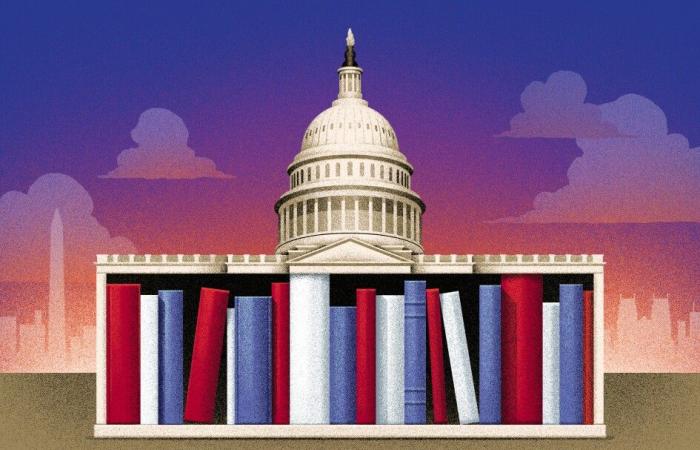The 2024 election is finally upon us, and more than 150 million people will be voting for a slew of federal, state, and local officials. If you’ve been paying attention this fall, you’ve heard a lot of emphatic claims about what’s at stake. While we await the election results—a process that could take days or weeks for some races—let’s try to address some frequently asked questions about what the results in the presidential election might mean for the next four years.
#1: If Donald Trump wins, is the Department of Education likely to be abolished?
Nope . Trump can’t abolish the department via executive action. It would require legislation. And, unless Republicans abolish the filibuster, they’d need the House majority and 60 votes in the Senate to make such a move. There’s some speculation that Republicans might follow Vice President Harris’ lead and try to abolish the filibuster but, with moderate Republican Sens. Lisa Murkowski (Alaska) and Susan Collins (Maine), along with a few other fence-sitters, it’s hard to see a slim GOP Senate majority mustering even 50 votes on abolishing the department. Meanwhile, plenty of influential right-wingers would rather see a Trump administration leverage the department than dismantle it . There are also proposals to reorganize the department by moving pieces to other agencies but this is also unlikely to occur—or, if it does, it’s unlikely to have much impact beyond the Beltway.
#2: If Kamala Harris wins, will there be a big federal pay raise for teachers?
It’s not likely. While Harris has been incredibly vague about her policy agenda this time around, during her 2019 campaign, one of her signature initiatives included proposing $300 billion in new federal funding for teacher pay. This is one of the handful of commitments she hasn’t walked back . Moreover, her first public event after Biden stepped down this summer was at the American Federation of Teachers’ annual convention. Given all that, there’s been some hopeful chatter about a big federal pay raise for teachers. But the odds are stacked against such a raise actually happening: Democrats aren’t expected to capture the Senate, the House is a toss-up there’s a long wish list of competing spending priorities, and Washington is straining under massive deficits.
#3: Would a Trump administration gut Title I or turn it into a voucher program?
No. There was a House vote on a proposal to voucherize Title I last year. It failed, 113-311 . Even if one imagines that somehow a Trump White House could pressure the House so effectively that it doubled that vote, he’d still need to get at least 50 votes plus Vice President Vance in the Senate. Veteran GOP nose-counters will tell you it’s tough to locate 45 Senate votes for voucherizing Title I, even if the Republicans outpace projections and wind up with 53 or 54 seats in the Senate. And given that Trump has spent the campaign saying he’ll lower taxes and mocking Project 2025-style calls for spending cuts (promising instead to add new benefits to Obamacare stop taxing tips protect Social Security and more), there’s no evidence he’d be ready to mount a high-profile, long-shot fight to cut funding for low-income kids.
#4: ESSER dollars have run out. What election outcome is most likely to deliver a new infusion of funding?
New ESSER-like dollars are very unlikely, though I can imagine one edge-case scenario in which they’re possible. Here’s the deal: While some analyses have reported some modest benefits from the spending, Republicans are deeply skeptical that the money was spent wisely. Meanwhile, Democrats have a slew of competing priorities. Now, maybe a Harris administration could deliver some funding if Democrats beat the odds to both capture the House and hold the Senate, and then squeeze a massive Build Back Better-style spending bill through the Senate via budget reconciliation (or after abolishing the filibuster). But this is really not how you’d bet. A Democratic sweep is a long shot, while inflation and snowballing deficits have made a crucial handful of centrist Democrats leery of huge spending bills.
#5: Would a Trump administration pass major federal school choice legislation?
It depends on how you define “major” but the short answer is: maybe. As noted, even if Republicans retain their razor-thin House majority and avoid defections to pass a bill, they’d struggle to get a voucher program through the Senate. While there’s room for bipartisan action on charter schools, the GOP has had little success attracting Democratic votes for private school choice proposals. Given all that, any kind of federal voucher program is very improbable. Far more likely is a tax-credit program (presumably along the lines of the Educational Choice for Children Act ) folded into major tax legislation and passed via reconciliation.
#6: It sounds like you’re saying the stakes are lower than one might expect. Are there any places where the results will matter a lot?
Absolutely. The reason it sounds like the stakes are low is that we’ve been talking about measures that require legislative action, and a closely divided Congress means it’ll be tough to get big things done. That said, there’s a lot that an administration can do through executive action. So, the outcome of the presidential election will matter enormously in areas such as Title IX, the shape of civil rights enforcement, student-loan “forgiveness,” and the federal response to campus protests. It’s worth noting, though, that the Supreme Court’s ruling in Loper Bright Enterprises v. Raimondo promises to curtail the ability of any administration to invent new powers or radically redefine old rules. So, the swing may be a bit less dramatic than in the past.
On the whole, it’s fair to say that the educational stakes are likely to prove far more modest than the partisans or overwrought pundits would have you imagine. If you’re a hard-core Harris aficionado or a Trump enthusiast, that may be disappointing. For the rest of us, it’s semi-reassuring. Heck, as I noted for EdWeek back in 2016, “For most of my adult life, I’ve been left cold by the candidates for president—which means I’ve always been comforted by the understanding that, regardless of whoever wins, they’d have only a very limited impact on our lives.” Once again, that’s truer than the media coverage might lead you to believe.






